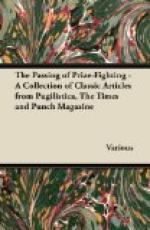* * * * *
JUSTICE FOR ’FRISCO.
DEAR MR. PUNCH,—I notice that a complaint has been made that those charming stories of wild life in the Far West, are out of date. Nay, more, that they are calculated to do a great deal of harm to a considerable amount of valuable property. On the other hand, the talented authors of the picturesque romances to which I have referred, insist that there is a great demand for these literary wares, and they would suffer much loss if they were to discontinue their production.
Could not the matter be compromised? We are less sensitive than our American cousins, and if the scene were changed from St. Francisco to some quiet watering-place on the Kentish Coast, our kindred beyond the seas ought to be satisfied. I do not pretend to be a master of the style of those who write Backwood sensations, but I think I can jot down a few lines to show what I mean. Beneath I give a specimen of the sort of thing that might take the place of stories revelling in such titles as the “Luck of Murder Camp,” “Slack Bill’s Banker,” and “The Talk of Stab-in-the-Backman’s Chasm.”
THE CHAFF OF HERNE BAY CREEK.
CHAPTER XX.—CHARLEY MEETS A CHUM.
The Miners who had been digging all day long the rough shingle for treasure-trove, had retired to their rudely constructed cabins. These rough huts were built of wood, and furnished with a seat on either side. There were two small windows let into the oaken walls—each of them not more than six inches square. They were absolutely free from furniture—save perhaps, a foot of cheap looking-glass, and here and there a wooden-peg used by the Miners for hanging up their slouch-hats, their red flannel-shirts, and their long leather-boots.
These huts were not unlike the other habitations in the wild Far West, save that they had this peculiarity—each hut was mounted on a huge springless framework, supported by four lumbering wooden wheels. By this arrangement the hut could be moved from place to place, sometimes to the fields, with their mines of undiscovered treasure; sometimes to the sea, burdened with legacies of the mighty deep.
CHARLEY was smoking a pipe, and thinking of that fair home in San Francisco, the very centre of civilisation, where the hotels were admirable, the stores well stocked, and house property at a premium.
“I did not discover a single ruby yesterday,” he murmured, and then he looked at the wooden spade of a child—“I found only there a young ’un’s toy. But it has softened my heart, and taught me that human nature is human nature.”
He paused to wipe away with a sunburnt hand a furtive tear.
“CHARLEY, my lad,” he exclaimed, “this is unmanly. What would DARE DEATH DICK or THUNDER TIM say to such a show of water?”
He took the spade, and was about to throw it with violence to the ground, when his better nature triumphed, and he placed it, almost with reverence, on the bench beside him.




